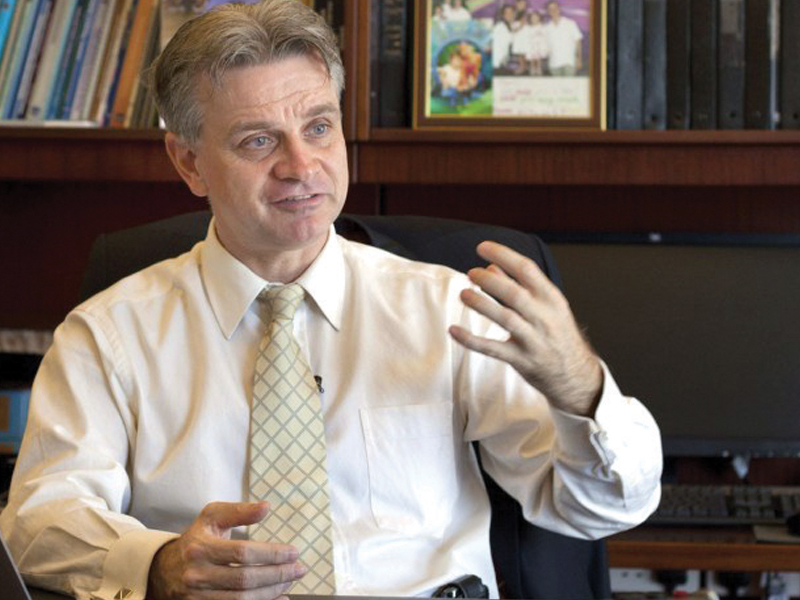
ISLAMABAD:
Pakistan has reached a critical balance of payments situation and will need another package from the International Monetary Fund (IMF) before the end of the year to avert a crisis, one of the biggest lenders to the country said on Wednesday.
The Asian Development Bank’s (ADB) country director, Werner Liepach, also told Reuters in an interview Pakistan will need up to $9 billion from the IMF to shield the economy.
Pakistan currently has enough hard currency to cover only about two months of imports. Asked if the nuclear-armed country, a key US ally, was in a balance of payments crisis, Liepach said:
“It depends how you define a crisis. Maybe we are already in a crisis.”
A fragile economy is just one of Pakistan’s myriad problems as it heads into an election expected in May.
The government is facing a stubborn Taliban insurgency and a worsening sectarian conflict in which hundreds have been killed in recent months. Chronic power cuts have undermined industries and held back economic development.
In 2008, Pakistan averted a balance of payments problem by securing an $11 billion IMF loan package, but the IMF suspended the programme in 2011 after economic and reform targets were missed.
Some analysts have since warned about the prospect of a new balance of payments crisis.
Asked if Pakistan could avoid going back to the IMF, Liepach said: “I do not see that happening. It is a question of time. They need to do this before the end of this calendar year.”

“It needs to be $6 billion to $9 billion.”
So far, remittances from Pakistanis working overseas of about $1 billion a month have helped keep Pakistan afloat, but by a thin margin.
“We are now at less than three months of imports. The current outlook is for a further decline in foreign exchange reserves,” said Liepach.
Crisis
The ADB, along with the IMF, has been encouraging Pakistan’s unpopular government to carry out politically-sensitive reforms to strengthen the economy and widen the country’s revenue base.
There are no signs Pakistani leaders, who are often consumed by rivalries and political crises, will carry out reforms such as a reduction of subsidies in the troubled energy sector and state-owned enterprises ahead of the national election.
Past decisions to raise fuel prices, for instance, have triggered street protests, prompting allies of the Pakistan People’s Party to leave the governing coalition and handing political ammunition to the country’s highly vocal opposition parties.
“Certainly there are political considerations currently. There are many, many exemptions that are given to special interest groups,” said Liepach.
“They have their ways of influencing to protect these exemptions. Some industries have special concessions on the tax base.”
Pakistan has one of the smallest tax bases in the world. About 0.5% of the population of 180 million pay income tax in a country which receives billions of dollars in financial support from the US and other Western allies.
“We do not have much of a reform effort at the moment,” said Liepach. “We have elections coming up and traditionally that is not the right time for reforms, which is a big concern because every day that passes by without reforms is a day lost. The economic situation is not improving.”
But the IMF has said it will not consider rescheduling repayments of the $6.2 billion Pakistan still owes without a comprehensive plan for reform agreed on by all political parties.
“There are many payments that need to be made to international organisations, most importantly to the IMF. There is a big chunk in payments to be done over the next two years that is not matched by inflows,” Liepach said.
The Pakistani rupee has eased 0.8% against the dollar so far this year after losing 7.6% in 2012. Last year’s slide was more severe than the fall of the Indonesian rupiah, which was the worst performing currency among the top traded regional units, according to Thomson Reuters data. On December 1, 2012, the rupee hit a record low of 98.24 against dollar.
“The saving grace at this moment in time is the relatively high remittances that continue to come. About a billion dollars plus a month,” said Liepach.
Published in The Express Tribune, March 7th, 2013.
Like Business on Facebook to stay informed and join in the conversation.
COMMENTS (2)
Comments are moderated and generally will be posted if they are on-topic and not abusive.
For more information, please see our Comments FAQ






















































“It depends how you define a crisis. Maybe we are already in a crisis.” ++++++++++++++++++++++++++++++++++++++++ Pakisatn= Crisis.
Overseas Pakistanis keep the country afloat and their loyalties are questioned, while the affluent within the country dont pay their taxes and think thats something to be proud of.